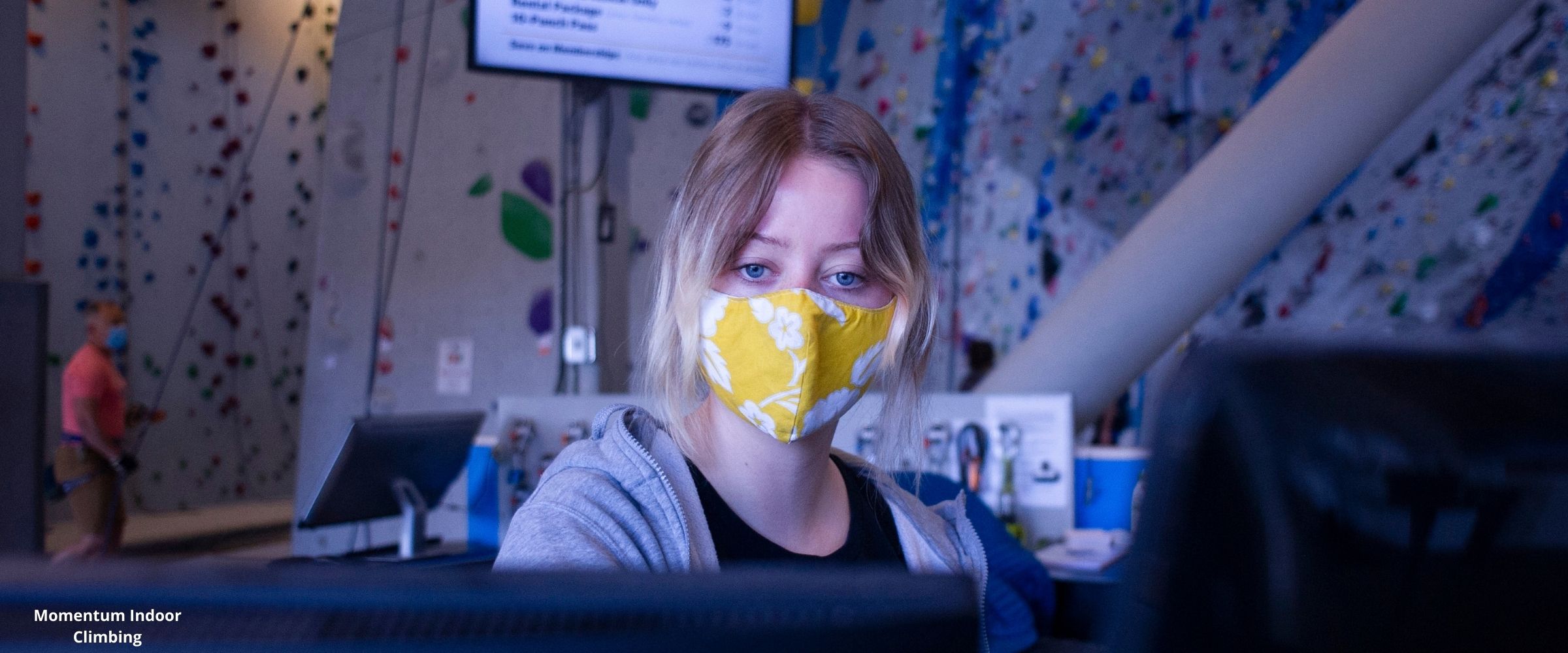The Intangible Benefits of Working in a Climbing Gym

There are many reasons we work at climbing gyms, and no matter where you are on the career ladder, there are several skills and abilities we can develop to enhance our lives and strengthen our resumes.
As we explore some of these areas of growth, we discover their interconnectedness and how they simultaneously enhance multiple professional avenues.
Leadership
While pursuing management is certainly one way to enhance our leadership skills, even working as a belay instructor gives instructors confidence to manage risk. Whether we are with seasoned climbers or first-timers, we hone our ability to mitigate risks and encourage our patrons.
The charismatic employee helps harness the satisfaction we gain from a send or simply a tremendous effort while enhancing the sense of accomplishment felt from our accomplishments on the wall.
The less gregarious employee fills their clients with quiet confidence to push harder, take a fall, or even leave the ground. Our devoted members may inadvertently take our watchful eye for granted, but when trouble arises and staff takes charge of the situation, we are all reminded—and appreciative—of the diligence of our gyms’ staff.
Education
A boon from trying new things is that we often discover more about ourselves—both likes and dislikes—that we wouldn’t have discerned without the new experience.
Enter coaching: whether we are assisting with the development of a new generation of climbers or helping adults with specific training, there are multiple options for us to explore the wonderful world of education; perhaps opening up new career possibilities for us to pursue.
In the most rudimentary sense, teaching an introductory class or working in any summer camp program grants us access to potential penchants for teaching, responsibility, and leadership. Beyond this level, we may find that few things make us happier than passing knowledge and skills onto others and recognizing—on some level—how our approach, care, and energy may be partially responsible for a burgeoning self-confidence, a love for climbing, and a sense of belonging.
Stewardship
Pride in our home gyms can come in a myriad of forms, including the quality of our setting, the diversity of our team, and the upkeep of our facility.
We see this pride in many of our members and through the enthusiasm of our peers, taking shape via our shared sense of ownership of our space.
Granted, our members are less likely to put in that extra bit of care that we do, but hey, that’s the job! All the mundane tasks that we may sigh and groan about—such as restocking restrooms and keeping them tidy—feed into the overall vibe and palpable sense of appreciation we feel when folks walk into our facility. Some may refer to these qualities as ‘customer service,’ and while I wouldn’t disagree that our sense of ownership translates into a quality customer experience, I would contend that it goes deeper than that. Many of these trait’s transition with us into the great outdoors, into our homes and other jobs, and our broader communities.
Medical Training
While the road to being an EMT or doctor may be a long one, every journey begins with a step; in this case, that ‘step’ may be a CPR/First Aid certificate. It would be naïve or dangerously foolish to believe our sport (and work environment) are not fraught with potential peril, spanning from the mundane and superficial to the catastrophic and life-threatening.
There is no shame in relying on medical professionals for the real gritty work—in fact, performing otherwise could be incredibly detrimental—but we hear all the time how someone’s quick intervention was the difference during that infinity-spanning time between an accident or emergency and the arrival of the paramedics. Being baptized in these scenarios obviously does not entail we’re all on the road to our medical degrees (indeed, it may illustrate to us how much our stomach is not acclimated to the profession), but it does irrevocably demonstrate our responsibility and level-headedness in times of trial.
Communication
Every climber understands the value of good communication skills, as we would be hopelessly lost without our safety checks, spotting instructions, and climbing commands.
Throughout our day-to-day duties, we need clarity in scheduling ourselves for work, coordinating with our colleagues, greeting / commiserating with our members, and driving home the importance of our facility rules to guests—and that’s on a regular day! As soon as an accident occurs or we need swift action to avoid calamity, our ability to communicate effectively morphs into our ability to lead and take charge of a situation. This is also an invaluable asset when it comes to multitasking (yet another useful ability we hone!) and presents itself throughout all of the skills discussed here.
READ ALSO: Improve Your Communication Among Your Team
Critical Thinking/Problem-Solving
Generating creative solutions to keep our customers and member base happy comes with the territory, as no business can thrive without maintaining positive experiences and interactions with everyone who walks through our doors. Our frontline staff are crucial to first-impression encounters and maintaining loyalty.
This can require a fair bit of tact at times, especially when we are balancing these experiences and special requests with the smooth flow of traffic and climber wellbeing. Here, we see the more nuanced (and potentially more consequential) critical thinking and problem-solving skills.
Knowing the most efficient way to assist someone whose hair, skin, or clothing becomes lodged in a belay device or those less-than-rare types who “could swear they clipped into the autobelay,” time is not always an ally.
If your gym doesn’t already have protocols and accompanying training in place to handle or address these relatively common occurrences, I implore you to initiate this conversation; while our quick thinking is admirable, it is to everyone’s benefit to have battle-ready plans in place.
Our ability to make quick, informed judgments and to take decisive actions can be the difference in averting or minimizing dangers and risks to our community. This skill acquisition is not only empowering in our day-to-day lives in the climbing gym (or at the crag) but is an evocative addition to any resume.
Bring It Together
While I dislike the word ‘expert,’ it is undeniable that our work environment empowers each of us to be knowledgeable, resourceful, confident, and encouraging, with ample opportunities to impact others’ lives in a myriad of ways.
The categories above are necessarily broad strokes, with a whole wide world of more specific possibilities leading out from it: guiding, personal training, nutrition, sports psychology, physical therapy, etc. The key is to bear in mind that our intentions affect our experiences, and the wonderful nature of our industry encourages us to explore so many less-trodden paths.
Anyone reading this should approach their facilities about CPR/FA training, HR certificates, community engagement, accessibility, supplemental resources, and any other necessary tool to better yourself and your environment.
Looking for a more tangible benefit to being a member of the CWA? Check out our new health insurance program.
About the Author
 Chris Oshinski is the assistant director for Sportrock Climbing Centers Sterling, VA location, passionate for teaching youth and addressing inequalities. Having obtained an MA in Public Sociology in 2018, Chris loves to explore the myriad forms of agency vis-a-vis individual and collective efforts at fostering social justice and human rights.
Chris Oshinski is the assistant director for Sportrock Climbing Centers Sterling, VA location, passionate for teaching youth and addressing inequalities. Having obtained an MA in Public Sociology in 2018, Chris loves to explore the myriad forms of agency vis-a-vis individual and collective efforts at fostering social justice and human rights.
